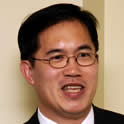By Andrew Chan
 I bought a DSLR camera a few years ago. It is quick to focus, and it can take multiple pictures in a second. Of course, the picture quality is also outstanding. I love it! Recently, I showed my camera to a friend who is a professional photographer. He told me that I had a good camera, but I didn’t know how to truly use it. What? I have been using this camera for a couple years now, and I don’t know how to use my camera? He asked me if I knew what the buttons and switches on the camera do. Well … I had to admit that I only knew how to use two of the buttons: the power button and the button to snap a picture. I never bothered to read the user manual, and I don’t even know where I put it. My friend was kind, and he spent a few hours to go over what the other buttons are for and how I should use them (e.g., what the shutter is and when I should adjust shutter speed). Since then, I have spent much more time with my camera trying out various settings. I also bought a few more lenses and an external flash, and I am even thinking about buying Adobe Photoshop. I still have much to learn, but at least now, I know more than just two buttons on my camera.
I bought a DSLR camera a few years ago. It is quick to focus, and it can take multiple pictures in a second. Of course, the picture quality is also outstanding. I love it! Recently, I showed my camera to a friend who is a professional photographer. He told me that I had a good camera, but I didn’t know how to truly use it. What? I have been using this camera for a couple years now, and I don’t know how to use my camera? He asked me if I knew what the buttons and switches on the camera do. Well … I had to admit that I only knew how to use two of the buttons: the power button and the button to snap a picture. I never bothered to read the user manual, and I don’t even know where I put it. My friend was kind, and he spent a few hours to go over what the other buttons are for and how I should use them (e.g., what the shutter is and when I should adjust shutter speed). Since then, I have spent much more time with my camera trying out various settings. I also bought a few more lenses and an external flash, and I am even thinking about buying Adobe Photoshop. I still have much to learn, but at least now, I know more than just two buttons on my camera.
Does this not apply to Excel as well? Everyone says they know Excel, but how many of us can actually utilize half of its full potential? I bought a DSLR camera, but I still used it as a point-and-shoot camera; many of us may have the latest version of Excel, but we still use it as Excel 95. I didn’t read my DSLR user manual; how many users have taken a training course or read a book on Excel?
Knowing all the buttons and switches on my camera won’t automatically result in good photos; there are many tips, tricks and best practices that I am still learning. Excel also has best practices which can result in more robust and faster financial models. For example, we need a properly managed development lifecycle to make sure our Excel applications will produce consistent results. A lot of Excel applications do not have any change management, release management or version control; anyone can modify an Excel workbook anytime they want. Good luck!
The other challenge is to understand the limits. My DSLR comes with a kit lens and in-camera flash. They are great, but they have their limitations. This is why there are so many different lenses and flashes available on the market; they are designed to handle different scenarios. Do you want to use a wide angle lens for a portrait photo? Excel has many great talents: it can store data, analyze data, present data, etc. However, we must also understand its limits. I often see gigantic workbooks (a few hundred megabytes in size) that have millions of records. Due to Excel’s row limit, data must be split into multiple worksheets. This necessitates creative methods to retrieve data from all these worksheets. An enterprise-grade database can handle data storage and data retrieval much more efficiently than Excel can; especially when we have a huge volume of data and a multiple user environment. Excel is also useful for developing basic financial models. However, if we want to run a model that contains millions of records and thousands of scenarios, it may take us days or even weeks to process. We should consider other tools that allow us to make use of parallel computing, grid computing or even cloud computing.
It will be a long journey for me to master my DSLR and I may never be a professional photographer. However, every small thing that I learn will improve the quality of my future photos. Excel is without a doubt the most popular software in the finance sector. We can significantly increase our productivity and also minimize operational risk if we know how to fully utilize it and follow industry best practices. Excel is a key component, but it should not be the only one. In order to become a true Excel master, we have to understand its strengths and weaknesses and know when we should consider using other software.
Andrew Chan, ASA, is a financial model engineer with ALG Consulting. He can be contacted at chan_a@algconsultings.com.